ANDERSON UNIVERSITY HALL OF FAME
Purpose
The Anderson University Athletics Hall of Fame was created to recognize and honor individuals who have made exceptional contributions to the department’s success throughout the University’s history. Members are selected every three years by the Hall of Fame Selection Committee from nominations submitted by alumni, staff, Athletic Fund members and friends of the University.
Anderson University Hall of Fame Guidelines
Anderson University Hall of Fame (Printable) Nomination Form
Anderson University Hall of Fame (Online) Nomination Form
Next Induction Class
October 2022
Nominations are accepted all year, with nominations submitted by June 1, 2022 being considered for the Class of 2022. All nominations submitted past the deadline will be considered for the next induction class (Class of 2025).
Members of the Anderson University Athletics Hall of Fame
Class of 2010
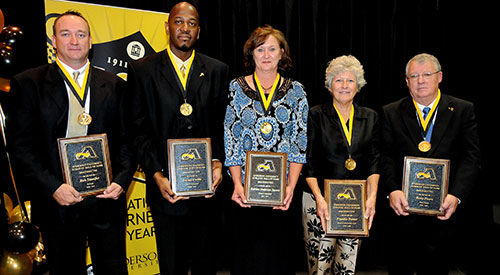
Katrina Anderson Sacoco
(Women’s Basketball)
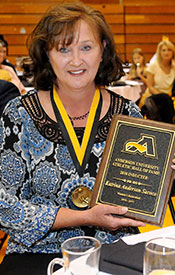
Katrina Anderson Sacoco played on the 1975-76 and 1976-77 back-to-back national championship women’s basketball teams and went on to play for the New Orleans Pride ('79-80) and Dallas Diamonds ('80-81) in the Women’s Professional Basketball League (WBL).
The Timmonsville, S.C., native averaged more than 18.6 points per game during her freshman campaign as the Trojanettes posted an impressive 38-2 record en route to claiming their third consecutive national title. Anderson Sacoco served as a team co-captain for the 1976-77 season and poured in a combined 78 points in a pair of double-digit wins past future Southeastern Conference teams South Carolina and Georgia.
She went on to play at South Carolina, becoming USC's first women's basketball All-America player, earning the honor in both 1978 and 1979. She remains the USC school record-holder for points scored in a single season, as she scored a school-record 754 points in 1977-78. She also holds the single-season school record for free throws attempted, rebounds, rebounding average and steals. Her career average of 20.5 points per game ranks as the second-highest mark in school history. She still ranks among the top 10 in USC history in 11 offensive categories and has been inducted into the University of South Carolina Hall of Fame after tallying 1,454 career points.
Anderson Sacoco coached at Lander University, compiling a 120-81 record over a seven-year span, reached the 20-win mark three times and earned Palmetto State Conference Coach of the Year honors in 1990-91.
Glenn Corbit
(Men’s Basketball)
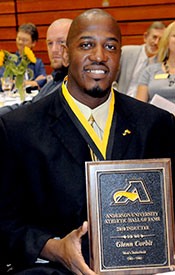
Glenn Corbit was the Western Carolina Junior College Conference Player of the Year in 1983 after leading the Trojans to the regular-season conference championship and Anderson’s appearance in the NJCAA regional title game.
As a freshman, Corbit averaged nearly a double-double, scoring a team-high 20.1 points and 9.6 rebounds per game in 1982.
A native of Orangeburg, S.C., Corbit set a school record at the time for scoring average in a season with his 23 points per game during the 1982-83 campaign, while also shooting 59.7 percent from the field. The 6-foot-6 Corbit served as team captain twice, and was the leader of a team that saw the entire starting quintet receive scholarship offers to four-year institutions following the ’83 season.
He earned First-Team All-Region X accolades twice and was also a two-time first team all-conference honoree. The third-team junior college All-American was named AC’s Male Student-Athlete of the Year in 1983.
Corbit earned his degree in liberal arts and after leaving AU, became a two-year starter at Clemson, where he averaged 10.1 points and nearly three rebounds per game for the Tigers. He helped lead Clemson to 35 wins and back-to-back appearances in the National Invitational Tournament.
Terry Poore
(Men’s Tennis)
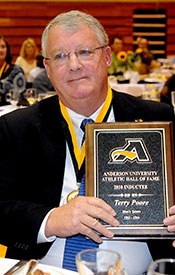
Anderson native Terry Poore lettered three years at Boys High School and achieved a No. 5 ranking in the Palmetto State during his prep career. As a junior he reached the state semifinals at the No. 1 position and captured second place in the state championship as a senior. Poore also claimed runner-up honors in doubles that year.
Poore did his part to help build the longstanding tradition of exceptional men’s tennis at AC, posting an unblemished mark in Western Carolinas Junior College Conference action in 1963, including capturing the WCJCC Singles Championship in Brevard, N.C.
He claimed the team’s Most Valuable Player award in 1963 after teaming with John Burden to take second place in doubles in the National Junior College Athletic Association National Championships in Joliet, Ill. The pair did not lose a match until falling in the finals to a duo from Odessa, Texas. Poore went on to finish third in the individual championship bracket after dropping a close decision in the semifinals.
Poore followed up by leading AC to a second-place finish in the 1964 WCJCC Tennis Tournament, again winning the individual conference title. He reached the semifinals of the NJCAA National Tournament in ’64, helping earn the team a fifth-place finish.
He wrapped up his two-year career at AC with an unblemished mark in the Western Carolinas Junior College conference over the two-year span and went on to play tennis for Florida State University.
Frankie Porter
(Women’s Basketball Coach)
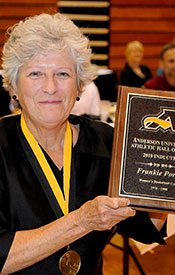
Frankie Porter was named head women’s basketball coach at Anderson College for the 1976-77 campaign, replacing distinguished AU Hall of Fame coach Annie Tribble. Porter guided the Trojanettes to yet another Southern Region II title and advanced to the AIAW Tournament, where they captured their fourth consecutive national championship with a 57-55 win past Peace College.
She captained the 1970-71 University of South Carolina basketball team that finished sixth in the nation in the first-ever AIAW National Tournament and also lettered in tennis at USC. She also served as a graduate assistant coach for tennis and softball, leading the Lady Gamecocks to a stellar 21-2 record and a berth in the 1976 AIAW World Series.
Porter coached the USC women’s basketball team during a transitional time - the 1975-76 season was less than a year after the “Carolina Chicks” took to the court as official members of the USC Athletics Department and the ‘75-’76 academic year also saw the first scholarships awarded to female student-athletes. After roaming the sidelines in Columbia for a season, Porter taught for a year at Hammond School then accepted the head coaching position at Anderson.
She led AC to its 22nd consecutive winning season in 1977-78 with a 17-10 record and coached through 1988, coaching six NJCAA All-Americans and guiding 16 players who went on to play at Division I programs. Porter earned Region X and WCJCC Basketball Coach of the Year in 1986 and was named WCJCC Volleyball Coach of the Year in both 1986 and 1987 after leading AC to a 27-8 record and a 10th place finish in the NJCAA Championship. She served as an assistant coach at the 1985 Olympic Sports Festival and was also an assistant coach for the 1987 National Jones Cup team, which won the gold medal in Taipei, Taiwan.
Rob Stanifer
(Baseball)
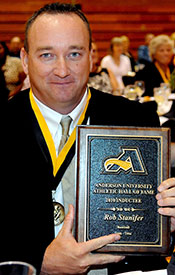
A native of Easley, S.C., Rob Stanifer, was a member of the baseball team’s first four-year class, competing from 1991-94. The 6-foot-3 right-hander helped lead the Trojans to the 1994 National Christian College Athletic Association National Championship and was named the NCCAA’s Player of the Year following that season.
During his career at Anderson, Stanifer posted a .367 batting average and recorded 156 hits, including 39 doubles, 10 triples and 18 home runs. He still tops the school’s single-season record with his 68 RBI during his senior campaign in 1994. Stanifer also displayed his versatility by notching 13 wins on the mound for AU and also recorded 11 saves during his career. He recorded 160 strikeouts in just 183 1/3 innings pitched, with an impressive 2.60 ERA.
Stanifer was drafted in 1994 in the 12th round by the Florida Marlins, and as a rookie was a member of the 1997 World Champion Marlins team. He appeared in 36 games on the mound as a reliever during that championship season, recording 28 strikeouts in 45 innings of work.
He played 12 years of professional baseball, including three for both the Marlins and Red Sox over three seasons.
Class of 2000
Jim Boykin
“I think when you go into a situation as a first-year coach with the job of reassembling a program that it’s an advantage and not as disadvantage,” Boykin said.” I knew Max from my days at Furman. OI knew his daughters. I knew Anderson would be a good place to be. The support was in the community. Everyone wanted to keep the program going.”
Boykin started the rebuilding process with the two players who survived the accident – Scott Dickey and Dhiren Rathod.
“Those two guys are great stories,” Boykin said.” Scott ended up playing, but he couldn’t move around the court as well as he wanted to because of his leg injury. Dhiren played No. 2 and did a good job. He reached the quarterfinals of the national tournament and went on to play No. 1 at UNC Charlotte.”
During his 13 years at AC, Boykin was named National Junior College coach of the Year twice (1986 and 1987) and Region X Coach of the Year 12 times. In 1994, he was elected to the NJCAA’s Tennis Hall of Fame.
“We won the national championship in ’86 and ’87 with two scholarships,” Boykin added. “We had it going from ’86 to ’90. People knew who we were. We were in theh top 10 every year, and I believe in ’86 and ’87 that if we had been a Division I program that we could’ve been in the top 10.”
When inducted into the Anderson Hall of Fame, Boykin was the head men’s tennis coach at UNC Charlotte.
David Buffamoyer
David Buffamoyer made the most of the opportunity given to him by Anderson College. Buffamoyer, a native of Greenville, wanted to play baseball after finishing his career at Berea High School but there were few offers.
“I wanted to go somewhere and AC gave me the opportunity,” Buffamoyer said. “AC was smaller and we knew everybody who came to the games. Everybody else said I was too small, But AC gave me an opportunity and I will always be thankful for that.”
At AC, Buffamoyer was the 1977 Region X Player of the Year and was named the Trojans’ Most Valuable Player. While playing at AC, Buffamoyer caught the eye of legendary Clemson coach Bill Wilhelm.
“I always wanted to play at Clemson,” Buffamoyer said. “We went to a tournament at DeKalb and I hit three home runs. The next day Coach Wilhelm gave me a call. He said, ‘I want you to come play for me, but I don’t think you’ll ever be a college graduate.’ Our personalities were a lot alike. I asked him to give me a shot at it and everything worked out for the best.”
In two seasons at Clemson, Buffamoyer batted .317 with 13 doubles, five triples, 12 home runs and 52 RBI. In his two seasons, the Tigers were 79-29 and won two Atlantic Coast Conference titles. In 1979 he was drafted in the 10th round by the New York Yankees. He played in the Yankees’ minor league organization for four years. During his stint with New York, he had the chance to go to the big league camp and work with some of the greatest players to ever play the game.
“I roomed with Don Mattingly, I played with Reggie Jackson and Dave Winfield and I caught Ron Guidry, Goose Gossage and Dave Righetti. It was a great honor to be in the Yankees organization. I would not have had that opportunity if AC had not given me a shot.”
After baseball, Buffamoyer enter the business world. At the time of his induction, he owned a Nationwide Insurance Agency.
Donna Forester Reed
Donna Forester Reed, a native of Carnesville, Ga., was a key member of AC’s national championship women’s basketball teams in 1975 and 1976. She averaged 20 points as a freshman and 27 points as a sophomore.
“For her size, she was the best rebounder I ever coached,” said Annie Tribble, who coached Forester Reed at both AC and Clemson.
“We had a lot of good players and teamwork” Forester Reed said. “We really jelled as a team. The hardest thing for me was the first day of practice. Georgia was still playing six on six and I was overwhelmed by 10 players on the same side of the floor. It took me a few weeks to adjust to that. I had to learn a new game. It was like starting over.”
During Forester Reed’s two years at AC, the Lady Trojans won 68 games.
“Being a member of a national championship team was the most exciting thing that ever happened to me. I had never been on the national level before.”
After completing her career at AC, Forester Reed played two years at Clemson. She averaged 20.2 points per game in 63 games for the Lady Tigers and at the time of her induction she was first on both the ACC and Clemson career list for rebounding average at 12.2. She is member of the Clemson Athletic Hall of Fame.
“I was going to go to the College of Charleston after I finished at AC,” Forester Reed said. “That spring we were out at the lake sunning and here comes coach Tribble. We all wondered what she was doing there. She ran up to me and said ‘I got the job at Clemson and you’re coming with me.’”
After graduating from Clemson, Forester Reed coached three years at Walhalla High School before entering school administration.
Class of 1999
Al Daniel
Daniel, a native of Saluda, S.C., earned All-America basketball honors at Anderson College and led the Trojans to the National Junior College Athletic Association National Tournament in Hutchinson, Kansas.
After two years at AC, Daniel transferred to Furman University, where he was an All-Southern Conference selection as a junior and a senior. He helped lead the Paladins to the 1978 SoCon title and a trip to the NCAA Tournament. Daniel was selected in the fourth round of the 1979 NBA draft by the San Antonio Spurs and is a member of the Furman Athletic Hall of Fame.
Max Grubbs
During his 20 years at Anderson College, Grubbs coached basketball and tennis and taught chemistry and health. A native of California, Grubbs graduated from Furman University in 1932. Under his leadership, the Anderson College men’s tennis team became a national junior college power. He also coached two daughters – Caroline Grubbs Singleton and Vicki Grubbs Cox – to national rankings as junior players.
On May 12, 1977, Grubbs and four of his players lost their lives in a traffic accident traveling to a regional tournament in Banner Elk, N.C. After the tragic accident, the tennis courts on the Anderson College campus were renamed the Max Grubbs Memorial Courts. On April 24, 1981, Grubbs was inducted into the South Carolina Athletic Hall of Fame for his contributions to tennis in the Palmetto State.
Janie Ruth Lee
Janie Ruth Lee’s plan was to join the Air Force after high school, but Larry Clark, her high school coach, changed her mind. Lee, a native of Holly Hill, S.C., was the first African-American female gto play basketball at Anderson College. In her two seasons with the Lady Trojans, she scored in double figures in every game, and she made the shot that won the first of AC’s three consecutive national championships under Annie Tribble.
Dhiren Rathod
Dhiren Rathod was a highly ranked junior player in India when he received a letter from Max Grubbs with an offer to play tennis at Anderson College. In two years at AC, Rathod played the No. 2 singles position and compiled a conference record of 21-2. He was one of two players to survive the accident on May 12, 1977 that took the lives of Grubbs and four of his teammates. After leaving AC, he played the No. 1 position at UNC Charlotte for two seasons, then played professional tennis.
Annie Tribble
Tribble, a native of Anderson and graduate of Girls High School, revived the women’s basketball program in 1967 and directed the Trojans to three national championships. In her first six seasons, AC was 66-19 and recorded one national runner-up finish. In 1974, she led the AC women to a 21-4 record and the first of three consecutive AIAW junior college national championships. The Lasdy Trojans also won national crowns in 1974-75 (30-8) and 1975-76 (38-2). Following the ’75-76 season, Tribble was named the head women’s coach at Clemson University. In 11 seasons at Clemson, Tribble had as record of 200-135. She is a member of the Clemson Athletic Hall of Fame.
Jim Wiles
From 1968-78 at Anderson College, Jim Wiles coached the winningest junior college basketball team in the country. The Trojans compiled a record of 248-65 and won eight consecutive conference titles and notched three undefeated seasons. Five times, Wiles was named Coach of the Year in the Western Carolina Junior College Conference and Region X. He directed AC to the National Junior College Athletic Association Tournament five times and reached the Final Four in 1978.